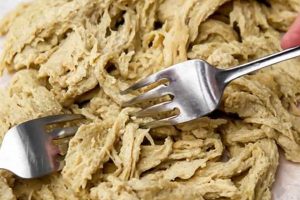Warning: Undefined array key "https://thisvegangirl.com/contact" in /www/wwwroot/thisvegangirl.com/wp-content/plugins/wpa-seo-auto-linker/wpa-seo-auto-linker.php on line 192
Chicken bouillon is a concentrated flavoring agent typically available in granulated, powdered, or cube form. Its primary function is to impart a savory, chicken-like flavor to soups, stews, sauces, and other culinary preparations. The critical point lies in its composition: traditional recipes invariably include dehydrated chicken meat, chicken fat, and various seasonings.
The presence of animal-derived ingredients directly contradicts the core tenets of veganism, a dietary philosophy that excludes all animal products and byproducts. Therefore, standard formulations are unsuitable for individuals adhering to a plant-based lifestyle. Historically, bouillon cubes and powders provided a convenient and inexpensive way to enhance the flavor of dishes, especially during times of scarcity or when fresh stock was unavailable. The modern implications of dietary choices, including veganism, have led to the development of alternative products.
Consequently, the question of whether a particular bouillon product aligns with vegan principles necessitates a thorough examination of its ingredient list. Attention must be paid to identifying potential animal derivatives and seeking out plant-based alternatives explicitly labeled as such. The following sections will delve into the specific ingredients to watch out for and explore the availability of certified vegan substitutes.
Careful consideration is required when selecting bouillon for vegan diets. The following guidelines offer insight for making informed choices.
Tip 1: Scrutinize Ingredient Lists: Meticulously review the ingredient declaration. Look for the explicit presence of chicken, chicken fat, or any other animal-derived product.
Tip 2: Identify Hidden Animal Products: Be aware of ingredients that may not immediately appear non-vegan. For example, “natural flavorings” can sometimes be derived from animal sources. Contact the manufacturer for clarification if uncertainty exists.
Tip 3: Seek Certified Vegan Products: Opt for bouillon products carrying a recognized vegan certification label. These certifications provide assurance that the product has undergone independent verification to meet stringent vegan standards.
Tip 4: Explore Vegetable Bouillon Options: Numerous vegetable-based bouillon cubes, powders, and pastes are available. These alternatives utilize vegetables, herbs, and spices to create savory flavor profiles.
Tip 5: Consider Nutritional Yeast: Nutritional yeast can contribute a cheesy or umami flavor to dishes. It serves as a suitable alternative to bouillon in certain recipes, adding depth without animal products.
Tip 6: Prepare Homemade Vegetable Stock: Crafting vegetable stock from scratch provides complete control over ingredients. This allows for customization to specific flavor preferences while guaranteeing vegan compliance.
Tip 7: Read Customer Reviews: Other consumers familiar with veganism can provide valuable insight regarding specific products.
Adhering to these recommendations ensures adherence to vegan principles while still allowing for flavorful culinary creations. Prioritizing ingredient awareness and seeking certified options mitigates the risk of unintentional animal product consumption.
The subsequent discussion will address specific brands and product lines recognized for their vegan-friendly formulations.
1. Animal-derived ingredients
The classification of a bouillon product as vegan hinges fundamentally on the absence of animal-derived ingredients. Standard chicken bouillon formulas contain constituents directly obtained from fowl, rendering them incompatible with vegan dietary practices. The following considerations clarify this incompatibility.
- Rendered Chicken Fat
Chicken fat, often listed as “chicken fat” or “rendered chicken fat,” is a common ingredient in traditional chicken bouillon. This ingredient is obtained by heating chicken carcasses and extracting the liquefied fat. Its presence definitively excludes the product from vegan consideration, as it is a direct byproduct of animal processing.
- Dehydrated Chicken Meat
Dehydrated chicken meat, or chicken powder, constitutes the primary flavoring element in chicken bouillon. The meat is cooked, processed, and dried to create a concentrated flavoring agent. As a direct component of an animal, it inherently violates vegan principles.
- Chicken Broth or Stock
Chicken broth or stock, derived from simmering chicken bones and meat, is another frequent ingredient. This liquid concentrate embodies the essence of chicken flavor but, due to its animal origin, disqualifies the bouillon from meeting vegan criteria.
- “Natural Flavorings” (Potential Ambiguity)
While the term “natural flavorings” itself is not inherently non-vegan, its ambiguity necessitates caution. Certain natural flavorings may be derived from animal sources. Reputable manufacturers of vegan bouillon products will explicitly state that their natural flavorings are plant-based to ensure transparency and consumer confidence.
The presence of any of these ingredients conclusively establishes that traditional chicken bouillon is not vegan. Individuals adhering to a plant-based diet must diligently scrutinize ingredient lists to identify and avoid these animal-derived components. Choosing products clearly labeled as vegan or opting for vegetable bouillon alternatives ensures adherence to vegan dietary standards.
2. Label Scrutiny
Effective label scrutiny is paramount when determining the vegan status of chicken bouillon products. Given that conventional formulations invariably include animal-derived ingredients, a detailed examination of the product’s ingredient declaration is essential to ensure adherence to plant-based dietary guidelines.
- Ingredient Identification
The primary objective of label scrutiny is to identify the presence of any non-vegan ingredients. This necessitates a comprehensive review of the entire ingredient list, paying close attention to potential animal products or derivatives. Examples include, but are not limited to, chicken fat, dehydrated chicken meat, chicken broth, and hydrolyzed animal protein. The absence of these specific ingredients is a prerequisite for a bouillon product to be considered vegan.
- “Natural Flavors” Assessment
The term “natural flavors” presents a unique challenge, as it can encompass both plant-based and animal-based sources. Unless a product explicitly states that its natural flavors are of plant origin, ambiguity remains. Contacting the manufacturer for clarification is advisable in such instances. Some manufacturers may use generic descriptions, necessitating further inquiry to ascertain the precise source and ensure vegan compliance.
- Hidden Animal Derivatives
Certain ingredients, while not explicitly indicating animal origin, may be derived from animals through processing. Examples include some forms of lecithin, which can be sourced from eggs, and certain stabilizers or emulsifiers. Thorough research and, if necessary, communication with the manufacturer, are required to identify such hidden animal derivatives and prevent inadvertent consumption.
- Allergen Information
Allergen information is also useful. While a product free of common allergens such as dairy or eggs is not necessarily vegan, the absence of such ingredients provides additional clarity regarding the product’s composition and reduces the likelihood of hidden animal products. Allergen statements can provide hints and supplement other aspects of ingredient analysis, but they do not offer a definitive vegan assessment.
In summation, determining whether a chicken bouillon product is suitable for vegan consumption demands meticulous label scrutiny. This process involves the identification of explicitly non-vegan ingredients, the assessment of potentially ambiguous terms such as “natural flavors,” and the investigation of hidden animal derivatives. Thoroughness and diligence in this process are essential to ensure compliance with vegan dietary principles and prevent the inadvertent consumption of animal products.
3. Vegan certification
Vegan certification serves as a critical verification system to assure consumers that a product aligns with vegan principles, particularly relevant when assessing whether any given bouillon product is suitable for vegan consumption, since standard chicken bouillon is definitively non-vegan. The certification process involves rigorous scrutiny of ingredients and manufacturing processes, providing a reliable method for identifying plant-based alternatives.
- Ingredient Verification
Vegan certification bodies conduct thorough investigations into the ingredient sourcing and composition of products. This includes identifying and excluding all animal-derived ingredients, byproducts, and potential contaminants. In the context of bouillon, certification ensures the absence of chicken meat, fat, broth, or any other animal component. This verification process assures consumers that certified bouillon products contain only plant-based ingredients.
- Manufacturing Process Audits
The certification process extends beyond ingredient verification to encompass audits of the manufacturing facility and production processes. These audits aim to prevent cross-contamination with animal products during manufacturing, packaging, and storage. For bouillon products, certification standards require dedicated equipment or stringent cleaning protocols to eliminate the risk of animal-derived residues. This safeguard ensures product integrity and aligns with vegan principles.
- Label Transparency and Compliance
Vegan certification mandates clear and accurate labeling of products, enabling consumers to readily identify vegan options. Certified products must prominently display the certification logo, along with a comprehensive ingredient list. This transparency empowers consumers to make informed purchasing decisions, confirming the absence of animal-derived ingredients. In contrast to chicken bouillon, certified vegan bouillons are readily identifiable by their certification marks.
- Ongoing Monitoring and Recertification
Vegan certification is not a one-time event but an ongoing process involving regular monitoring and recertification. Certification bodies conduct periodic inspections and audits to ensure continued compliance with vegan standards. This continuous oversight ensures that certified bouillon products consistently meet the requirements of vegan consumers. Manufacturers must demonstrate sustained adherence to vegan principles to maintain their certification status.
In conclusion, vegan certification plays a critical role in determining the compatibility of bouillon products with vegan dietary guidelines. By verifying ingredients, auditing manufacturing processes, ensuring label transparency, and conducting ongoing monitoring, certification bodies provide assurance that certified bouillon alternatives are free from animal-derived components and align with vegan principles. Consumers seeking vegan-friendly bouillon options should prioritize products bearing reputable vegan certification labels.
4. Vegetable alternatives
Given the definitive non-vegan status of traditional chicken bouillon, vegetable alternatives emerge as a critical component for individuals adhering to plant-based diets. These alternatives provide a method for achieving savory flavor profiles in culinary applications without resorting to animal-derived ingredients. The availability and suitability of vegetable bouillon options directly impact the ability to maintain a vegan lifestyle while still enjoying flavorful dishes.
- Base Ingredients and Flavor Profiles
Vegetable bouillons typically derive their flavor from a combination of dehydrated vegetables, herbs, spices, and seasonings. Common ingredients include onions, carrots, celery, garlic, parsley, and thyme. These ingredients are processed to create concentrated powders, cubes, or pastes that mimic the savory taste of traditional bouillon. Different brands and formulations offer varying flavor profiles, ranging from mild and subtle to robust and complex, allowing for customization based on culinary preferences. For example, some vegetable bouillons may emphasize umami notes through the inclusion of mushrooms or seaweed, while others focus on herbaceous profiles with a blend of aromatic herbs.
- Nutritional Considerations
Vegetable bouillon alternatives often exhibit differing nutritional profiles compared to their chicken-based counterparts. Generally, vegetable bouillons tend to be lower in fat and cholesterol, while maintaining comparable levels of sodium. However, sodium content can vary significantly across brands and formulations. Careful review of nutritional labels is essential to manage sodium intake. Certain vegetable bouillons may also be fortified with vitamins or minerals, enhancing their nutritional value. The presence of artificial additives, such as MSG or artificial colors, should also be considered, especially for individuals with sensitivities.
- Culinary Applications and Versatility
Vegetable bouillons can be seamlessly integrated into a wide range of culinary applications, mirroring the versatility of traditional bouillon. They serve as flavor enhancers in soups, stews, sauces, gravies, and vegetable dishes. Vegetable bouillon can be dissolved in water to create a flavorful broth or added directly to recipes as a seasoning. The concentrated nature of bouillon allows for precise control over flavor intensity. Chefs and home cooks often use vegetable bouillon to boost the savory notes in vegetarian and vegan recipes, replicating the depth of flavor that might otherwise be achieved with animal-based stocks. For example, a vegan risotto can benefit from the addition of vegetable bouillon to enhance its umami character.
- Commercial Availability and Product Variety
The market for vegetable bouillon alternatives has expanded considerably in recent years, reflecting the growing demand for plant-based dietary options. Numerous brands offer a wide range of vegetable bouillon products in various formats, including powders, cubes, pastes, and liquids. These products are readily available in supermarkets, health food stores, and online retailers. Some brands specialize exclusively in vegan and vegetarian products, while others offer vegetable bouillon as part of a broader product line. The increasing commercial availability of vegetable bouillon alternatives ensures that consumers can easily access plant-based options that meet their culinary needs. Furthermore, the variety of available formulations allows consumers to select products that align with their specific taste preferences and dietary requirements.
In conclusion, vegetable alternatives provide a necessary substitute for traditional chicken bouillon, enabling individuals adhering to vegan diets to maintain flavor and culinary integrity. The selection of appropriate vegetable bouillon requires consideration of ingredients, nutritional content, culinary applications, and commercial availability. By carefully evaluating these factors, consumers can effectively replace chicken bouillon with plant-based alternatives that meet their dietary needs and culinary preferences. The development and widespread availability of these alternatives underscore the growing importance of plant-based options in modern culinary practices.
5. Homemade stocks
The question of whether chicken bouillon is vegan directly correlates with the option of preparing homemade stocks. Since traditional chicken bouillon contains animal products, it inherently contradicts vegan dietary principles. Homemade stocks, specifically vegetable stocks, offer a suitable vegan alternative. The ability to create a flavorful, plant-based stock from scratch allows individuals to completely avoid commercially produced chicken bouillon and its associated non-vegan ingredients. The cause: commercial chicken bouillon contains chicken. The effect: it is not vegan. Therefore, a need arises for a substitute, and homemade vegetable stock addresses this directly.
The importance of homemade stocks extends beyond simply replacing chicken bouillon; it provides complete control over ingredients. Commercially available vegetable bouillons, while often vegan-friendly, may contain additives, high sodium levels, or ambiguous “natural flavors” whose sources may be unclear. Preparing stock at home from fresh vegetables, herbs, and spices allows for complete customization. For example, a chef preparing a vegan French onion soup would need a flavorful stock base. Purchasing a pre-made vegetable bouillon carries risks regarding hidden ingredients, while creating a homemade vegetable stock guarantees a vegan product and allows for tailored flavor profiles. This has practical significance for individuals with dietary restrictions or those seeking to minimize processed ingredients.
In conclusion, the inherent non-vegan nature of chicken bouillon necessitates the exploration of alternatives. Homemade vegetable stock presents a viable solution, offering complete control over ingredients and eliminating the uncertainty associated with commercial products. While commercially-produced vegan bouillons exist, homemade stocks provide the most reliable means of ensuring compliance with a plant-based diet. The option requires effort, but guarantees the outcome and offers the benefit of tailored flavor combinations. This approach fully addresses the dilemma posed by the question: is chicken bouillon vegan?
Frequently Asked Questions
The following questions address common inquiries and misconceptions regarding the vegan status of chicken bouillon. These answers aim to provide clarity and assist individuals in making informed dietary choices.
Question 1: Does standard chicken bouillon inherently contain animal products?
Yes, traditional chicken bouillon formulations invariably include dehydrated chicken meat, chicken fat, and/or chicken broth. These components are animal-derived and therefore incompatible with vegan dietary principles.
Question 2: Can the term “natural flavorings” in bouillon ingredient lists indicate animal origins?
The term “natural flavorings” is ambiguous. While many natural flavorings are plant-based, some may originate from animal sources. Manufacturers should be contacted for clarification when the source is uncertain to confirm vegan compliance.
Question 3: Are vegetable bouillon cubes and powders automatically vegan?
Not necessarily. Vegetable bouillon products require careful label scrutiny to ensure the absence of hidden animal-derived ingredients. Certain formulations may contain lactose or other non-vegan additives.
Question 4: Is vegan certification a reliable indicator of plant-based compliance in bouillon products?
Yes, vegan certification by a reputable organization provides a high degree of assurance that the bouillon product meets established vegan standards, including ingredient verification and manufacturing process controls.
Question 5: Are there specific brands of bouillon that consistently offer certified vegan options?
Several brands specialize in vegan bouillon products, often utilizing vegetable-based ingredients and carrying vegan certification labels. Consumers should consult current product listings and certifications for the most up-to-date information.
Question 6: Can homemade vegetable stock effectively replace store-bought chicken bouillon in recipes?
Yes, homemade vegetable stock offers a complete substitute for chicken bouillon, providing control over ingredients and ensuring vegan compliance. Homemade stock can be tailored to specific flavor profiles and dietary needs.
The key takeaway is that careful investigation is crucial. Chicken bouillon is generally not vegan, and determining the plant-based status of any bouillon product requires careful consideration of ingredient lists, potential hidden animal derivatives, and certifications.
The next section will summarize key considerations for selecting vegan bouillon alternatives.
Concluding Assessment
This exploration of the inquiry “is chicken bouillon vegan” has established a definitive incompatibility. Traditional formulations of chicken bouillon invariably incorporate animal-derived ingredients, rendering them unsuitable for vegan consumption. The presence of dehydrated chicken meat, chicken fat, or chicken broth directly contravenes the fundamental principles of a plant-based diet. The onus, therefore, rests upon the consumer to exercise diligent scrutiny of product labels, identify potential hidden animal derivatives, and seek out certified vegan alternatives.
The pursuit of ethically and nutritionally sound dietary choices necessitates unwavering vigilance. The increasing availability of vegetable-based bouillon options and the feasibility of crafting homemade vegetable stocks provide viable pathways for avoiding animal products. Thoughtful purchasing decisions, informed by a thorough understanding of ingredient origins and manufacturing processes, remain paramount. The informed consumer contributes to a marketplace that increasingly reflects conscientious and sustainable practices, reinforcing the significance of dietary awareness in the pursuit of ethical consumption.







